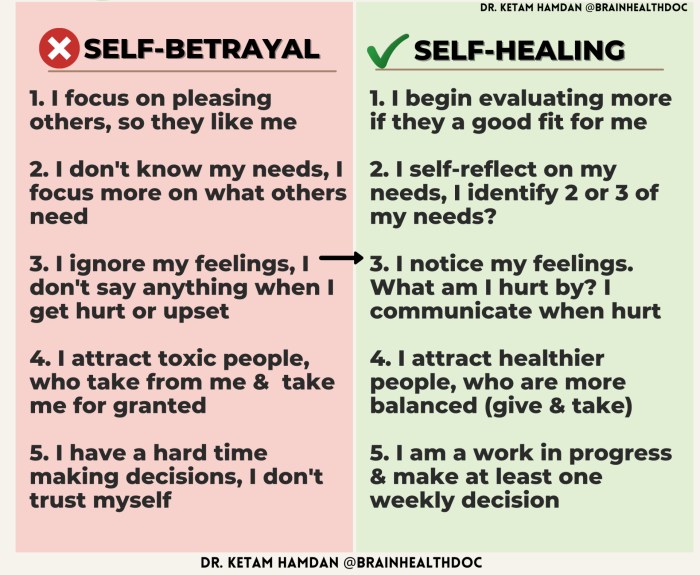The concept of “act of self betrayal crossword” delves into the intricate realm of self-betrayal, exploring its multifaceted nature and profound implications. This captivating topic invites us on a journey to decipher crossword clues, delve into cultural and literary references, and unravel the psychological and ethical complexities that surround this enigmatic act.
From examining the psychological mechanisms that drive self-betrayal to analyzing historical examples and exploring its ethical ramifications, this discussion promises to shed light on the profound consequences of betraying oneself.
Definition of Self-Betrayal

In the context of the crossword clue, self-betrayal refers to actions or behaviors that go against one’s own values, beliefs, or moral compass.
Self-betrayal can manifest in various ways, such as:
Denying One’s Own Needs
- Ignoring or neglecting personal health, well-being, or happiness.
- Prioritizing others’ needs and desires over one’s own.
Compromising One’s Integrity
- Engaging in dishonest or unethical behavior.
- Breaking promises or commitments.
- Conforming to societal expectations at the expense of personal beliefs.
Suppressing or Ignoring One’s True Self
- Adopting a false persona to fit in or gain acceptance.
- Denying or suppressing one’s true emotions, thoughts, or desires.
Crossword Puzzle Clues

Crossword puzzles often use wordplay and logic to create clues that can be challenging to solve. The term “act of self-betrayal” can be used in crossword puzzles in various ways, depending on the context and the specific clue.
Types of Crossword Puzzle Clues, Act of self betrayal crossword
- Definition Clues:These clues provide a straightforward definition of the answer. For example, “An act of self-betrayal” could be clued as “Denial of one’s own beliefs or principles.”
- Synonym Clues:These clues provide a synonym or near-synonym of the answer. For example, “Act of self-betrayal” could be clued as “Treason.”
- Antonym Clues:These clues provide an antonym or near-antonym of the answer. For example, “Opposite of self-sacrifice” could be clued as “Act of self-betrayal.”
- Wordplay Clues:These clues use wordplay or puns to create a more challenging clue. For example, “What you do when you sell yourself out” could be clued as “Act of self-betrayal.”
Cultural and Literary References

Self-betrayal is a complex and multifaceted theme that has been explored in countless cultural and literary works throughout history. These works often depict the devastating consequences and profound impact of self-betrayal, offering valuable insights into the human condition.
One of the most famous examples of self-betrayal in literature is the story of Judas Iscariot, who betrayed Jesus Christ for 30 pieces of silver. Judas’s act of betrayal is often seen as the ultimate example of self-betrayal, as he not only betrayed his friend and mentor but also his own moral compass.
In Literature
In literature, self-betrayal is often explored through the characters’ internal struggles and conflicts. These characters may be forced to make difficult choices that compromise their values or beliefs, leading to feelings of guilt, shame, and regret.
- In Shakespeare’s play “Hamlet,” the titular character struggles with the moral implications of avenging his father’s murder. Hamlet’s indecision and procrastination ultimately lead to the deaths of several innocent people, including his beloved Ophelia.
- In Fyodor Dostoevsky’s novel “Crime and Punishment,” the protagonist, Raskolnikov, commits murder in order to prove his superiority. However, Raskolnikov’s guilt and remorse eventually drive him to confess his crime and accept punishment.
- In Toni Morrison’s novel “Beloved,” the protagonist, Sethe, kills her infant daughter in order to protect her from slavery. Sethe’s act of self-betrayal haunts her for the rest of her life, as she struggles to come to terms with the consequences of her actions.
Psychological Aspects: Act Of Self Betrayal Crossword

Self-betrayal is a complex psychological phenomenon that involves acting against one’s own values, beliefs, or desires. It can manifest in various forms, from minor acts of self-sabotage to significant life choices that have lasting consequences.
At its core, self-betrayal stems from a deep-seated sense of inadequacy or unworthiness. Individuals who engage in self-betrayal often struggle with low self-esteem and a lack of self-acceptance. They may feel that they are not good enough or that they do not deserve to have their needs met.
Role of Self-Denial
Self-denial is a key mechanism that underlies self-betrayal. It involves suppressing or ignoring one’s own needs, desires, or values in order to conform to external expectations or to avoid perceived threats.
Self-denial can be a form of self-protection, as it can help individuals to avoid conflict or to maintain a sense of belonging. However, it can also lead to feelings of resentment, guilt, and shame.
Cognitive Dissonance
Cognitive dissonance is another important factor that contributes to self-betrayal. It occurs when an individual’s actions are inconsistent with their beliefs or values. This can lead to feelings of discomfort, anxiety, or guilt.
To resolve cognitive dissonance, individuals may engage in self-betrayal in order to justify their actions or to reduce the discomfort associated with their inconsistency.
Historical Examples
Throughout history, individuals have succumbed to self-betrayal, driven by a myriad of motivations and circumstances. By examining these historical examples, we can gain insights into the complexities of human nature and the profound consequences of betraying oneself.
If you’re feeling betrayed, don’t despair. The “act of self betrayal” crossword puzzle can help you sort out your feelings. And if you’re looking to become a notary public in New York, be sure to check out our free nys notary practice exam . It’s the perfect way to prepare for the real thing.
Once you’ve passed the exam, you’ll be able to notarize documents and help others protect their legal rights. So don’t wait, start studying today!
One prominent example is that of Brutus, a Roman senator who played a pivotal role in the assassination of Julius Caesar. Brutus was torn between his loyalty to Caesar and his belief in the Roman Republic. Ultimately, he chose to betray Caesar in the name of preserving the republic, a decision that ultimately led to his downfall.
Julius Caesar
- Brutus was a close friend and confidant of Caesar.
- He was initially loyal to Caesar but became disillusioned with his growing ambition.
- Brutus believed that Caesar’s rule threatened the Roman Republic.
- He joined a conspiracy to assassinate Caesar and played a key role in his death.
- After Caesar’s death, Brutus’s actions led to civil war and his eventual defeat.
Judas Iscariot
Another notable example is that of Judas Iscariot, one of Jesus Christ’s twelve apostles. Judas betrayed Jesus to the authorities for thirty pieces of silver. His motivations for this act remain a subject of debate, with some scholars suggesting that he was disillusioned with Jesus’ teachings or sought to force Jesus to reveal his true identity.
- Judas was one of Jesus’ twelve disciples.
- He was responsible for managing the group’s finances.
- Judas became disillusioned with Jesus’ teachings and believed he was not the Messiah.
- He betrayed Jesus to the authorities for thirty pieces of silver.
- Judas’s actions led to Jesus’ arrest and crucifixion.
Benedict Arnold
Benedict Arnold was a general in the Continental Army during the American Revolutionary War. He initially fought bravely for the American cause but later defected to the British side. Arnold’s motivations for this betrayal were complex, involving a combination of personal grievances, financial difficulties, and a desire for recognition.
- Benedict Arnold was a successful general in the Continental Army.
- He was passed over for promotion and became resentful.
- Arnold began to communicate with the British and offered to betray West Point.
- His plot was discovered, and he fled to the British side.
- Arnold’s betrayal damaged the American cause and made him a hated figure in American history.
These historical examples illustrate the profound consequences of self-betrayal. Whether driven by ambition, disillusionment, or personal gain, the act of betraying oneself can have devastating effects on both the individual and those around them.
Ethical and Philosophical Considerations

Self-betrayal raises significant ethical questions. Betraying one’s own values, principles, or beliefs can undermine personal integrity and self-respect. It can also erode trust in oneself and others, as well as damage relationships.
Philosophical Perspectives on Self
Philosophical perspectives on the nature of self influence our understanding of self-betrayal. Some philosophers, such as Immanuel Kant, argue that the self is a rational, autonomous being capable of making free choices. From this perspective, self-betrayal is a violation of one’s own moral agency.
Other philosophers, such as Jean-Paul Sartre, emphasize the existential nature of the self. They argue that the self is constantly evolving and being shaped by one’s experiences and choices. From this perspective, self-betrayal can be seen as an inevitable aspect of human existence.
Consequences of Self-Betrayal
Self-betrayal can have profound consequences for the individual. It can lead to feelings of guilt, shame, and self-loathing. It can also damage one’s self-esteem and confidence. In extreme cases, self-betrayal can lead to mental health problems, such as depression and anxiety.
FAQ
What is the definition of self-betrayal?
Self-betrayal refers to the act of violating one’s own values, beliefs, or moral compass, resulting in a sense of inner conflict and dissonance.
How can self-betrayal manifest in crossword puzzles?
Crossword clues may use the term “act of self-betrayal” to describe actions or behaviors that involve betraying one’s own principles or beliefs, often leading to negative consequences.
What are some cultural or literary works that explore the theme of self-betrayal?
Works such as Shakespeare’s Hamlet, Dostoevsky’s Crime and Punishment, and Toni Morrison’s Beloved delve into the complexities of self-betrayal and its far-reaching effects.